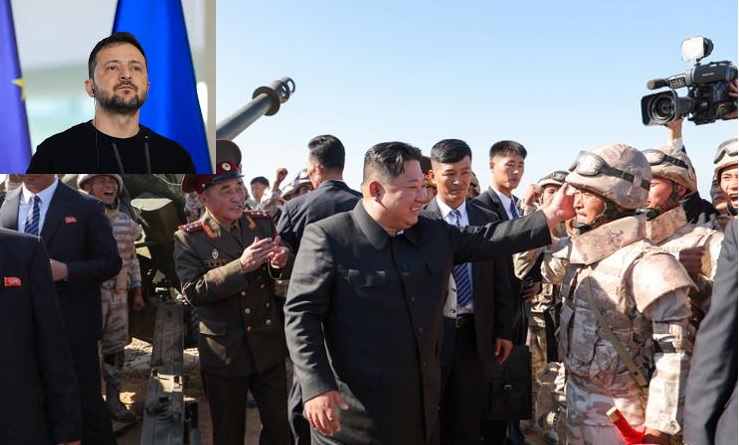Zelenskyy Claims North Korea is Joining Russia’s War Effort Against Ukraine

Ukrainian President Volodymyr Zelenskyy recently accused North Korea of becoming actively involved in Russia’s ongoing war against Ukraine. In a video address marking the 964th day since Russia launched its full-scale invasion, Zelenskyy claimed that Moscow is working to draw Pyongyang into the conflict as a strategic partner, especially with plans for increased collaboration in the fall and winter months.
According to Zelenskyy, Ukrainian intelligence, including the Foreign Intelligence Service and the Main Directorate of Intelligence (GUR), has reported on Russia’s evolving military plans and growing coordination with North Korea. This development indicates a potential shift in the geopolitical dynamics surrounding the war. The alleged involvement of North Korea, with its history of military isolationism, adds a new dimension to Russia's support network in the conflict, potentially lengthening the war and complicating Ukraine’s efforts to push back.
Reports from Western media suggest that North Korean military personnel were initially sent to Russia to assist in the assembly and upkeep of **KN-23 ballistic missiles**, which North Korea has been supplying to bolster Russia’s military capabilities. These missiles, which bear similarities to the Russian Iskander system, provide a significant addition to Russia’s artillery and missile strike options. The involvement of North Korean engineers in the Donbas region has also been reported, with their role focusing on **maintaining artillery systems and overseeing ammunition logistics**.
Andriy Kovalenko, head of Ukraine’s Center for Countering Disinformation, indicated that the presence of North Korean military personnel extends beyond technical roles. They are said to be monitoring Russian military logistics, accompanying shipments of ammunition, and supervising their usage on the battlefield. Such activities hint at a more hands-on approach, possibly providing Russia with specialized manpower and expertise in munitions management, areas that have been pressured by Ukraine’s recent counteroffensives.
Moreover, The Washington Post has reported that several thousand North Korean soldiers are undergoing training in Russia, with plans to deploy them to Ukraine by the end of the year. This potential deployment of foreign troops would mark a significant escalation in the conflict, suggesting that Russia is not only seeking military aid from its allies but is also preparing to use additional manpower to stabilize or expand its operations in the face of Ukrainian advances.
Zelenskyy’s remarks underscore concerns about the wider implications of Russia’s military alliances. He noted that countries like North Korea, which face international sanctions and diplomatic isolation, may find value in closer military ties with Moscow, especially as both nations contend with pressure from Western powers. By aligning with Russia, North Korea could be looking to gain economic and military concessions, while Russia would benefit from additional resources and support to sustain its military campaign.
The alleged collaboration between Russia and North Korea signals a concerning trend where isolated states forge military partnerships to defy global norms. For Ukraine, the prospect of North Korean troops joining the war or providing substantial logistical support represents an additional challenge in a conflict that is already complex and devastating. The idea that Pyongyang would actively contribute to prolonging the war indicates how geopolitical rifts are reshaping alliances and forcing countries to take sides in the ongoing struggle for influence in Eastern Europe.
As winter approaches, the Ukrainian military and its Western allies are closely monitoring the situation. The potential involvement of North Korean personnel raises new questions about Russia's capacity to replenish its forces and maintain its war efforts. The reported cooperation also serves as a stark reminder of how far Russia is willing to go in order to continue its military campaign, even reaching out to nations with little history of open international military engagement.
Zelenskyy’s statements highlight the urgency for continued international support to Ukraine, especially if Russia's military cooperation with North Korea leads to more direct involvement on the ground. The stakes in the conflict are being raised, as Russia's strategic moves signal a determination to escalate, rather than de-escalate, the war.
The growing evidence of North Korean involvement, from missile assembly to possible troop deployments, suggests that the conflict is entering a new phase, one where proxy support could increasingly come into play. With the global geopolitical landscape shifting, the implications of this partnership are far-reaching, potentially influencing the outcome of the war and the future of military alliances.


